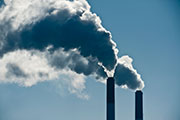- 8 Ways to Increase Dopamine Naturally
- 7 Best Breads for Maintaining Stable Blood Sugar
- Gelatin vs. Collagen: Which is Best for Skin, Nails, and Joints?
- The Long-Term Effects of Daily Turmeric Supplements on Liver Health
- Could Your Grocery Store Meat Be Causing Recurring UTIs?
- Are You Making This Expensive Thermostat Error This Winter?
- Recognizing the Signs of Hypothyroidism
- 10 Strategies to Overcome Insomnia
- Could Artificial Sweeteners Be Aging the Brain Faster?
- Techniques for Soothing Your Nervous System
Rise in Deaths Even When Smog Is Below EPA Standard: Study


Death rates among people older than 65 appear to be affected by air pollution, even when the air they breathe meets current standards, researchers say.
In the study, Harvard researchers looked at Medicare recipients in the New England region. The investigators found that death rates among seniors were linked to levels of a type of air pollution called “fine-particulate matter” — even in places where air pollution levels were below those recommended by the U.S. Environmental Protection Agency (EPA).
No evidence exists for a “safe” level of pollution, said senior report author Joel Schwartz, a professor of environmental epidemiology at the Harvard School of Public Health in Boston. Instead, “we need to focus on ways that lower exposure everywhere all the time,” he cautioned.
The report was published online June 3 in the journal Environmental Health Perspectives.
Particulate matter (PM) is the term for particles found in the air, including dust, dirt, soot, smoke and liquid droplets. Particles less than 2.5 micrometers in diameter (PM2.5) are referred to as “fine” particles and are believed to pose the greatest health risks. Because of their small size (approximately 1/30th the width of a human hair), fine particles can lodge deeply into the lungs.
Sources of fine particles include all types of combustion — from cars, power plants, wood burning and certain industrial processes, according to the EPA.
Earlier studies have linked exposure to PM2.5 with increased deaths from heart disease, high blood pressure and reduced lung function, Schwartz said.
Using satellite data, Schwartz and his colleagues determined pollution levels and temperatures for all of the ZIP codes in New England. This let them examine effects of PM2.5 pollution in areas far from monitoring stations. In addition, they analyzed Medicare data on deaths in the same region from 2003 to 2008.
The investigators found that short- and long-term exposure to fine-particle pollution was associated with higher death rates among the study group, even in areas with annual exposures below EPA standards.
Short-term (two-day) exposure led to a 2 percent increase in death rates for each increase of 10 micrograms per cubic meter of air (10 mcg/m3) in concentration of PM2.5. And long-term (one-year) exposure led to a 7.5 percent increase in death rates for each 10 mcg/m3 increase in concentration of PM2.5, the study found.
Janice Nolen, assistant vice president for national policy at the American Lung Association, said, “These findings are not surprising.”
The EPA needs to enact tougher standards to reduce the levels of air pollution even more, she said.
“We have made a lot of progress, but there is still a long way to go,” Nolen added.
Schwartz agreed. “EPA needs to tighten the particle standard further,” he suggested.
“We need to reduce the particles in the air, which we can do with off-the-shelf technologies,” Schwartz said.
“Current regulations still allow some coal-burning power plants to avoid using scrubbers, and that is raising death rates on the East Coast,” Schwartz said.
“Moreover, EPA’s recent wood stove and diesel standards do not require retrofits, and local governments will need to deal with this to reduce these avoidable deaths,” he added.
More information
For more about air pollution and health, visit the U.S. Environmental Protection Agency.
Source: HealthDay
Copyright © 2026 HealthDay. All rights reserved.










